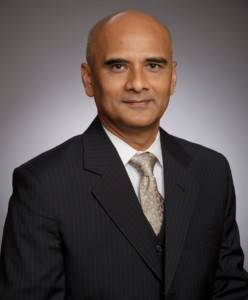PRAIRIE VIEW, Texas (January 19, 2023) — Ram Ray, Ph.D., associate professor in the Cooperative Agriculture Research Center at Prairie View A&M University (PVAMU), has been granted over $2,500,000 to lead a project for experimental approach developing advanced tools to conduct agroecological measurements as part of the PVAMU-Shell Nature Based Solutions (NBS) Research Program.
The project includes multiple Co-PIs:
- Laura Carson, Ph.D., Director, Cooperative Ag Research
- Aruna Weerasooriya, Ph.D., Professor, Cooperative Agriculture Research Center
- Richard Griffin, Ph.D., Professor, Research Scientist, Agriculture Nutrition & Human Ecology
- Ali Fares, Ph.D., Endowed Professor, Water Security, Cooperative Agriculture Research Center
- Lijun Qian, Ph.D., Endowed Professor, Electrical & Computer Engineering
- Yunxiang Gao, Ph.D., Assistant Professor, Chemistry
- Javad Barouei, Ph.D., Associate Professor, Cooperative Agriculture Research Center
Dr. Ray and his team are excited about the opportunity this funding provides the PVAMU Cooperative Agriculture Research Center.
“It was excellent support at the right time,” said Dr. Ray. “I started the Greenhouse gases (GHGs) monitoring project in 2016. Since then, I have been trying to get external funding support to advance my research on quantifying GHGs and experimenting with innovative approaches to address some critical issues.”
“The PVAMU-Shell USA, Inc. partnership on Nature Based Solutions that we established for our faculty researchers has been progressing well and this partnership also gives PVAMU students the invaluable benefit of hands-on learning opportunities,” said Magesh Rajan, vice president of Research & Innovation. “In addition, through this partnership, our capacity to target research projects and initiatives critical to the greater global community advances PVAMU’s mission to address issues and challenges affecting the diverse ethnic and socioeconomic population of Texas and the larger society including the global arena.”
Soil is a fundamental factor in food production as it provides the necessary cultivation media for growing crops. Soil organic carbon (SOC) is an important soil parameter of agricultural soils, ensuring food security and agricultural sustainability. It plays a crucial role in the global carbon budget and carbon sequestration.
In addition, the soil microbial community (bacteria, archaea, viruses, algae, fungi, and protists) plays a crucial role in soil functions regulating plant growth through the cycling of organic carbon and other nutrients. Moreover, agriculture and landscape management practices, which include soil amendment, nutrient management, irrigation management, and other practices, have a significant role in controlling soil’s physical, chemical, and biological characteristics, which ultimately impact SOC sequestration and greenhouse gases (GHGs) emissions.
There is growing interest in better managing soils and plants to increase SOC and reduce carbon emissions to mitigate climate change. Since SOC cannot be easily measured or quantified, a key barrier to implementing effective soil carbon sequestration strategies at a large spatial scale is the urgent need for effective and reliable measurement and monitoring, reporting, and verification (MRV).
Soil carbon sequestration through nature-based solutions (NBS) demands in-depth investigations and innovative tools and technology to characterize and quantify the SOC change and associated components, such as soil’s physical, chemical, and biological characteristics.
This project’s main goal is to develop innovative strategies and interventions to reduce GHG emissions and increase soil carbon sequestration without compromising the yield of crops.
For Dr. Ray, this is funding is representative of a much larger agricultural standpoint and overall benefit.
“I am mostly looking to advance our research capacity to address some of the critical issues on GHGs quantification and monitoring based on nature-based Solutions,” said Ray. “We will evaluate innovative interventions and quantify GHG (e.g., CO2, CH4, and N2O) for each amendment and ecosystem at the field scale. In addition, I am also looking for the potential opportunity to develop strong collaboration within the college, PVAMU, and other institutions across the USA and globally.”
###
By Jenna Craig

